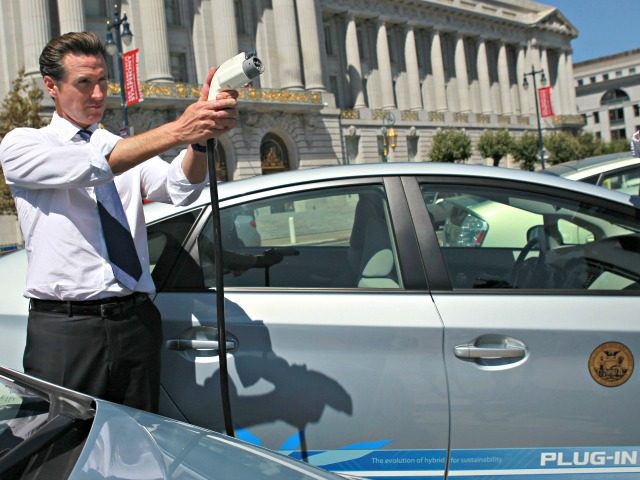California “lacks a clear strategy” to meet the ambitious climate change goals set by Gov. Gavin Newsom (D) and the Democrat-dominated legislature, according to a report by the nonpartisan Legislative Analyst’s Office.
The report, released Wednesday, assesses California’s plan to achieve the goals it has set in recent years: 100% renewable energy by 2045; a ban on sales of gas-powered cars in 2035; and other goals, none of which will have much direct effect on the phenomenon of global climate, but which aim to lead and inspire other jurisdictions.
Growing emissions from China and India dwarf U.S. emissions, which have fallen in recent years without heavy regulations. U.S. Climate “czar” John Kerry has also admitted that even if both the U.S. and China produced no emissions, climate change would still exist due to the long half-life of greenhouse gases in the atmosphere.
Regardless, the issue remains central to Democrats and their elected leaders, and California, under Newsom, has declared the most ambitious goals in the country despite electricity shortages and rising heating costs.
In its analysis, the Legislative Analyst’s Office notes that California has no real idea how to achieve its targets (original emphasis):
California has established statutory goals for reducing statewide GHG [greenhouse gas] emissions—down to at least 40 percent below the 1990 level by 2030, and to at least 85 percent below the 1990 level by 2045. The California Air Resources Board (CARB) must develop a plan for meeting these goals, and update this Scoping Plan every five years. In its recently adopted plan, CARB selects its preferred pathway to meeting the state’s long‑term 2045 GHG goal, and adopts a new, more ambitious goal for 2030 (48 percent reduction below the 1990 level).
Plan Lacks a Clear Strategy for Meeting 2030 GHG Goals. In this brief, we evaluate CARB’s plan for meeting the state’s 2030 GHG goals. Despite the significant reductions needed to meet these goals, CARB’s plan does not identify which specific policies it will implement. For example, the plan is unclear regarding how much the state will rely on financial incentives, sector‑specific regulatory programs, or cap‑and‑trade. Rather, the plan’s estimated reductions are driven primarily by assumptions developed by CARB, without specifying how those assumed outcomes might be achieved. The lack of focus on policy options is a missed opportunity that has important ramifications for California’s overall GHG reduction efforts …
The report notes that California’s plan lacks information about the cost-effectiveness of its policies, or policy alternatives, and that it delegates key responsibilities to state government departments. It warns that only rapid policy changes could possibly allow California to reach its goals, and that these could prove widely disruptive.
As a result, the report warns, California could fail to reach its ambitious goals, which “could adversely affect California’s ability to serve as an effective model for other jurisdictions or demonstrate global leadership.”
Joel B. Pollak is Senior Editor-at-Large at Breitbart News and the host of Breitbart News Sunday on Sirius XM Patriot on Sunday evenings from 7 p.m. to 10 p.m. ET (4 p.m. to 7 p.m. PT). He is the author of the recent e-book, Neither Free nor Fair: The 2020 U.S. Presidential Election. His recent book, RED NOVEMBER, tells the story of the 2020 Democratic presidential primary from a conservative perspective. He is a winner of the 2018 Robert Novak Journalism Alumni Fellowship. Follow him on Twitter at @joelpollak.

COMMENTS
Please let us know if you're having issues with commenting.